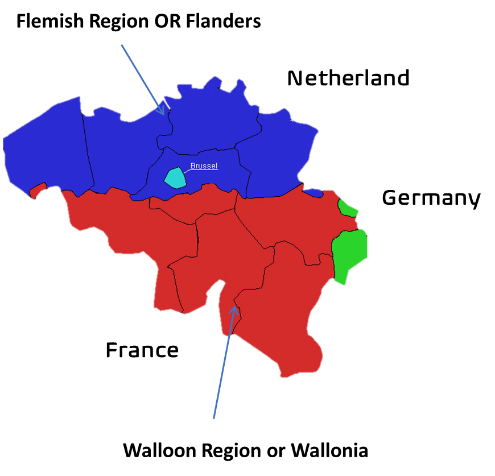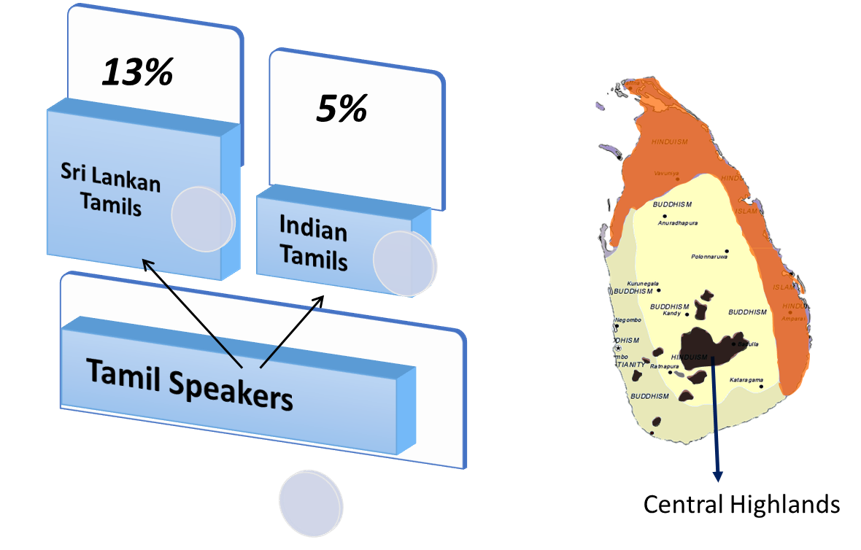New words and phrases
- Ethnic Group: A community or population made up of people who share a common cultural background or descent. People speaking a particular language can form on ethnic group, even though they belong to different religions, caste or race.
- Social diversity: Diversity found in the society based on gender, religion, caste, language, race, number etc.
- Constitution Amendment: A change made in the Constitution of a country.
- Accommodation: A process of mutual adaptation between persons or groups, usually achieved by eliminating or reducing hostility, as by compromise or arbitration.
- Autonomous: self-governing; independent; subject to its own laws only.
The story of Belgium
Geographical position and Ethnic Composition
- Size: Smaller than Haryana
- Population: One crore
- Neighbouring countries: France, Netherlands, Germany and Luxembourg
Belgium
Social composition of the country
Dutch speaking: 59% – mostly found in the north (Flemish)
French speaking: 40 % – Mostly found in the south (Walloon)
German speaking: 1 % – Mostly found in the west

Belgium
Social composition of the capital Brussels
French speaking: 80%
Dutch speaking: 20%
Causes of tension between the Dutch and the French
- The French were rich and powerful
- The Dutch got the benefits of educational and economic development much later
- A civil strife broke out.
- The strife was very severe in the capital Brussels.
- The country almost went to the verge of disintegration.
Accommodation in Belgium
The constitution was amended four times between 1970 and 1993 to accommodate cultural and ethnic diversity
1st
The central cabinet shall have equal representation of the Dutch speaking and French speaking ministers. Some special laws require the approval of majority from both the communities.
2nd
Belgium was divided into provinces and many powers of the Centre were transferred to the provinces. These provincial governments are not subordinates to the centre.
3rd
A unique form of government called community government is formed which is voted by people of the three linguistic groups. Three subjects are transferred to this government. They are language, culture and education.
4th
The capital Brussels has a separate government with equal representation of the French speaking and the Dutch speaking communities.
Advantages of Belgian Model of Power sharing
- This model of power sharing between the linguist groups has worked very well for Belgians so far.
- It has avoided civil strife.
- European Union has its Head Quarters at Brussels, the capital of Belgium.
Long answer Questions
- How did Belgium accommodate its ethnic and cultural diversity?
OR
Why was there tension between the social groups of Belgium? How was problem solved?
Short Answer Questions
- Explain the social composition of Belgium.
- Why did Belgium almost go to the verge of disintegration?
- What are the advantages of Belgian Model of Power Sharing?
- Mention the constitutional amendment brought about in Belgium that changed it from unitary democracy to federal democracy.
Test your understanding of the story of Belgium : Answer the following MCQs and Assertion and Reason Questions
The Story of Belgium
The Story of Sri Lanka
Social/ethnic composition
Sinhala Speakers: 74%. They are mostly Buddhists.
Tamil Speakers: 18%. They are Hindus and Muslims
7-8% – Christians: Some speak Tamils and other speak Sinhala
Sri Lankan Tamils: Sri Lankan natives who speak Tamil
Indian Tamils: Their forefathers went to Sri Lanka as plantations workers.

In Sri Lanka, we find linguistic (Sinhala, Tamil), religious (Buddhism, Hinduism, Islam and Christianity) and numerical (74% Sinhalese, 18% Tamils) diversity.
Definition of Majoritarianism: Rule of the majority community, that too it wants to rule, totally disregarding the minority communities.
Majoritarianism in Sri Lanka
Sri Lanka became free in 1948. The democratically elected government formed by the Sinhalese followed one language, one community and one religion policy to impose their supremacy over the minority Tamils.
One Language Policy
In 1956 an act was passed that recognised Sinhala as the only official language.
One Religion Policy
The constitution was amended to protect and foster Buddhism
One Community Policy
The constitution was amended to protect and foster Buddhism
Demands of Tamils
- Recongnition for their language
- A state with autonomous status
Civil War: A war like conflict between the communities of a country
Effects of Majoritarianism on Tamils
- Tamils felt isolated
- They though that even the constitution was against them.
- None of the political parties represented Tamils’ demands.
- They formed groups, parties to fight for rights but nothing in their favour.
- LTTE (Liberation Tigers of Tamil Elum) was formed.
- A large scale civil war broke out.
- Thousands of Sinhalese and Tamils were killed in the civil war.
- Thousands of Tamil families went out of the country as refugees.
Long Answer Questions:
- What is Majoritarianism? How was it implemented in Sri Lanka?
- What was the effect of Majoritarianism on Tamils in Sri Lanka?
- Both Belgium and Sri Lanka have social differences. Yet, they handled their social differences differently. Which one do you support? Why?
Answer for Q.No. 3:
Social diversities can be a source of conflict but Democracy has the ability accommodate social diversities.
I support the way Belgium accommodated its social diversity for the following reasons.
- In Belgium, linguistic diversity was the source of conflict where as in Sri Lanka, all the three namely, linguistic, religious and numerical diversities overlapped to become the sources of civil war.
- Both Belgium and Sri Lanka almost went to the verge of disintegration but it was prevented in both the countries very differently.
- Belgium followed the path of accommodation. In contrast, Sri Lanka followed the path of Majoritarianism.
- Belgium ensured that all the linguistic groups get fair chance to enjoy power. In the central cabinet there is equal representation of the French speaking and Dutch speaking communities.
- Power is also shared vertically creating provincial governments. These governments at the lower level are not subordinates to the centre.
- Even the capital Brussels has a government with equal representation of the two major linguistic groups.
- In order to respect the aspiration of all the linguistic groups, Community government was formed that can make laws on language, culture and edcuation.
- Belgium thus accommodated its ethnic and cultural diversities. On the other hand, in Sri Lanka, the government ruthlessly implemented majoritarianism.
- Accommodation in Belgium is in line with the principles of democracy. Majoritarianism can not be accepted in any democratic country.
Short answer questions
- Explain the one language, one community and one religion policy adopted in Sri Lanka.
- Why did civil war break out in Sri Lanka?
- Why do you think LTTE was formed in Sri Lanka?
Source based Questions
Read the following extract and answer the questions that follow
All these government measures, coming one after the other, gradually increased the feeling of alienation among the Sri Lankan Tamils. They felt that none of the major political parties led by the Buddhist Sinhala leaders was sensitive to their language and culture. They felt that the constitution and government policies denied them equal political rights, discriminated against them in getting jobs and other opportunities and ignored their interests.
- Mention the government measures that increased the feeling of alienation among the Sri Lankan Tamils.
- Why do you think the Sri Lankan Tamils felt that their constitution was against them?
- Why do you think none of the major political parteis led by the Sinhalese showed sensitivity to the Tamil language and culture?
Test your understanding of the story of Sri Lanka: Answer the following MCQs and Assertion and Reason Questions
The Story of Sri Lanka
Prudential Reasons for power sharing
They are the reasons arrived at after considering positive and negative outcomes. They stress that power sharing brings positive outcomes. The prudential reasons for power sharing are as follows.
Power sharing reduces the possibility of social conflicts, brings about political stability and makes administration easy. For example, the lack of power sharing in Sri Lanka resulted in social conflict and political instability. Administration was not at all easy.
Imposing the will of majority on minority may appear a good option to establish peace. But in the long run it becomes counterproductive and can come in the way of national integration. For example, majoritarianism in Sri Lanka, resulted in demand for a separate nation.
Tyranny of the majority brings ruins both to the majority and minority. To avoid such a consequence, power sharing is necessary.Tyranny (cruelty) can be both mental and physical. Majoritarianism in Sri Lanka resulted in civil war in which both the Tamils and Sinhalese suffered.
Moral Reasons for power sharing
They are the reasons arrived at after considering positive and negative outcomes. They stress that power sharing brings positive outcomes. The prudential reasons for power sharing are as follows.
Power sharing is the foundation of democracy. It is the very heart and spirit of democracy. In an ideal democracy, as many people should be able to enjoy power. So, power sharing is necessary.
People are affected by the decisions taken in democracy. So, they have the right to be consulted and the right to know how they are to be governed.When people are consulted before taking decision, then people also would have enjoyed power, at least indirectly.
A legitimate government is one where people through participation acquire stake in the system.
In other words, people of all social groups, irrespective of their language, religion or caste should get a fair chance to enjoy power.
Forms of Power Sharing
Horizontal power sharing or the system of checks and balances
- In this form, power is shared between the three organs of the government.
- The three organs – the Legislature, the Executive and the Judiciary are placed at the same level but they perform different functions.
- None of them enjoys unlimited power.
- So, balance of power sharing is maintained between the organs.
- All the three organs check each other to ensure that they function within the constitutional limits.
- So, this horizontal power sharing is called the system of checks and balances.
- For example, even though the judges are appointed by the legislature, the court hears cases against the parliament and the elected representative.
- A Judge can be removed by initiating impeachment proceeding in legislature.
Vertical Power sharing
- In this form, power is shared between the governments placed at different levels.
- There is the central government for the country taking responsibility of subjects of national significance like defense, currency, banking etc.
- Below the central government, we find provincial/state governments taking responsibilities of subjects of local importance like agriculture, irrigation, police etc.
- In a big country like India, the hierarchy goes down to the grass root. The governments below the state governments are called Local Self Governments.
Power shared between social groups.
- Socially weaker sections and those social groups that were denied of political power for long, should also get a chance to enjoy power.
- It is ethical and moral to share power with such disadvantaged groups.
- Community government in Belgium is a good example of power shared among different social groups.
- In India, it is ensured that all social groups enjoy power by giving political reservations. Fixed number seats (84 for SCs and 47 for STs) are reserved in Lok Sabha. Some constituencies are reserved form where only the people belonging to a backward caste can contest. Women and OBCs enjoy reservation in Local Self Governments.
Power shared between Political parties, pressure groups and movement groups
- Political parties enjoy power in the following three different ways.
- The party that secures more than half of the seats forms the government and enjoys power directly.
- If no party secures majority, then more than one party form a coalition government. Thus, many political parties enjoy power simultaneously.
- Opposition parties enjoy power indirectly by putting pressure on the government.
- Stiff electoral competition ensures that no single party enjoys power for long time.
- Pressure groups are mostly the groups of people belonging to one profession or who follow one ideology.
- They pressurise the government to make policy or policy changes in their favour. Farmers association, bank employee’s association, student unions are some examples.
- Movement groups like save environment movement, anti-liquor movement etc. also enjoy power indirectly.
Long answer questions
- How far do you agree with the statement that power sharing is keeping with the ‘spirit’ of democracy?
- Give reasons why power sharing is desirable.
- Distinguish between horizontal power sharing and vertical power sharing.
- How do political parties, pressure groups and movements groups enjoy power?
Short answer questions.
- Why the horizontal power sharing is called the system of checks and balances?
- How is it ensured that all social groups get a chance to enjoy power?
OR
How can democracy become politically and socially inclusive?
- Pressure groups also enjoy power. Explain how.
Source based question
Read the following and answer the questions that follow
Annette studies in a Dutch medium school in the northern region of Belgium. Many French-speaking students in her school want the medium of instruction to be French. Selvi studies in a school in the northern region of Sri Lanka. All the students in her school are Tamil-speaking and they want the medium of instruction to be Tamil.
- Which is the largest spoken language in the Northern region of Belgium?
- Which is the largest spoken language in Sri Lanka?
- Between the parents of Annette and Selvi, who is likely to meet their demand? Explain why.

